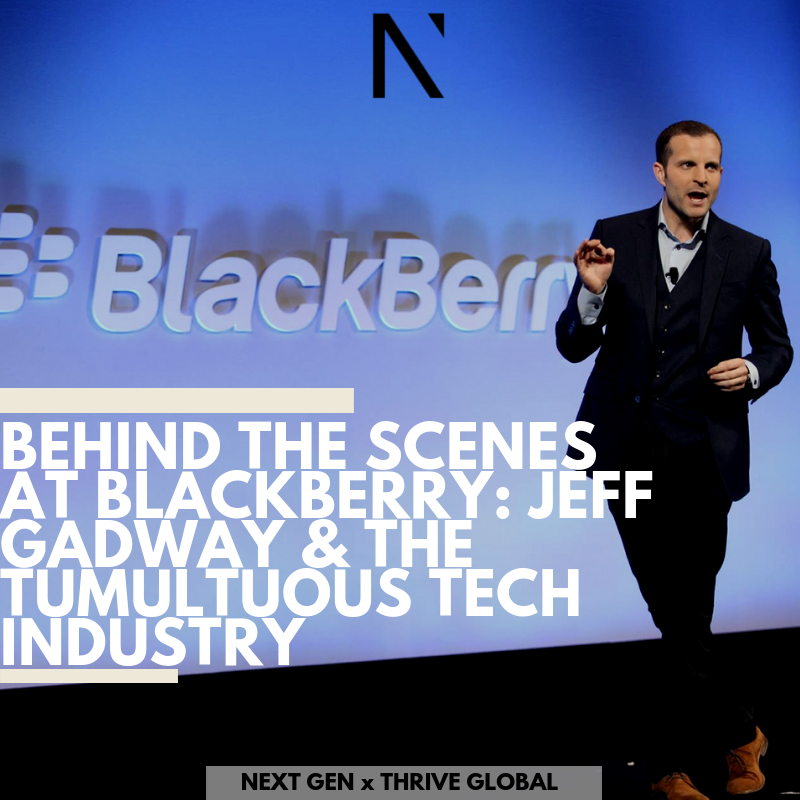It was 2006, and Jeff Gadway was still in college when he joined the team at Research in Motion – the company that created the BlackBerry.
Ah, yes, the BlackBerry. I was not yet of cell-phone usage age in the height of BlackBerry’s dominance but everyone who was someone had a BlackBerry. They appeared in movies, commercials, and I watched my childhood best friend’s mom, who owned her own PR company, type away on her beloved gadget day in and day out. The ‘cool’ factor of a BlackBerry was impressionable upon everyone.
In Jeff’s words, “Everyone wanted a BlackBerry.” Even Oprah: It made her list of “favorite things.”
Meet Jeff
A born and raised Canadian, Jeff was finishing up his college years at Wilfrid Laurier University in Waterloo ON when he became the Carrier Marketing Manager at BlackBerry. He quickly rose through the ranks to serve as the Director of Worldwide Product Marketing for them, which catapulted him into a public-facing role.
By Jeff’s mid 20’s, he was responsible for launching new products that were changing the tech game; managing multi-million dollar budgets; guiding global agencies; overseeing a Super Bowl TV commercial shoot, giving media interviews and setting marketing strategy for global products.
As the company spokesperson, he conducted the product demos for global launches, sold $1,000,000 of BlackBerry phones on home shopping channel in 12 hours, and was featured on CNN, NBC, Today Show, WSJ, NYT. He was BlackBerry’s “go-to” influencer: the point person for celebrity BlackBerry users like J-Lo, Marc Anthony, SJP, Matthew Broderick, Alicia Keys, Cuba Gooding Jr., Tim Allen, Haim, and more.
Introducing: The iPhone.
Only one year later, in 2007, the iPhone launched and flipped the tech game on its head. Jeff reflects, “At BlackBerry, many underestimated the impact that iPhone would have on the industry and consumer preferences. Typing on a piece of glass over a physical keyboard? Who would want that? Well it turns out that consumers spoke…loudly and with their wallets.”
And, there’s nothing like competition to get in the head of the original market share owner. In Jeff’s words, BlackBerry turned to “reacting, instead of leading.”
“We were under tremendous pressure to respond with our ‘iPhone killer’ and in doing so, we missed an innovation cycle that left us playing catch up,” Jeff shared. “Plus, in trying to compete on Apple’s terms, we sacrificed quality in favour of speed and neglected to build on the DNA that made our brand authentic, relevant and valuable.”
Failure as the Best Teacher
Despite the fall of BlackBerry, Jeff’s time on their team served him immeasurably. I was specifically interested in how he learned to adapt to the everchanging tech industry with the threat of competition, especially in the early days, as the global smartphone phenomenon was just erupting. He shared the following insights:
- Emotional Benefits Trump Functional Benefits. “BlackBerry was a company that prided itself as being built by engineers. That attitude translated into our marketing for many years. We highlighted functional benefits of the product like durability, battery life, data efficiency, speed and keyboard accuracy. iPhone changed the game and re-framed the smartphone category from a rational purchase to an emotional purchase. They created product lust by painting a picture of a lifestyle over focusing just on features and benefits. Later in my career at BlackBerry when I was running product marketing, we embraced this approach in launching products with tremendous success.”
- It’s not what they buy. It’s what they buy in to. “What you’re selling isn’t just a product, it’s a story: a set of beliefs; a point of view on the way you see the world. More than buying your product, your customers are buying into an idea. It’s not necessarily the best product that always wins, it’s the best story that wins. As barriers to technological innovation come down all around us, product differentiation is becoming harder to sustain. Clear positioning – who your for and what you believe in – can become a new, sustainable differentiator.”
- Understanding who your customer really is. “At BlackBerry, we heavily relied on wireless carriers (AT&T, Sprint, T-Mobile, etc.) to sell our smartphones. We catered a lot to their needs, like building products that were efficient on data bandwidth. As consumer preferences evolved to value more apps and richer mobile browsing, we didn’t evolve with them. The things that made us desirable in a low data consumption 3G world (efficiency) were no longer valuable in a 4G LTE world driven by apps, web browsing and streaming. Had we focused more on the end user as our customer, and not the carrier, maybe we would have seen that sooner.”
On Choosing to Leave Blackberry
Despite rocky times in the competition, Jeff held on within Blackberry for a good amount of time – nine years, in fact. “BlackBerry was going through a turnaround with a new CEO and a new focus. While there were significant layoffs across BlackBerry, I was always in a very strong position with a bright future at the company. I left on my own. After 9 years, I felt like it was time,” he shared. “I needed to broaden my horizons, get some new experiences and re-find my passion for marketing. My spark had gone out, and as someone driven by passion and curiosity, I knew I needed to take action to re-ignite it.”
He interview for big companies like Apple, Samsung and Google, and entertained offers from local and international startups. “I even briefly considered opening a Menchies fro-yo shop in the Bahamas,” he shared. “Ultimately, I weighed the options on factors ranging from culture, team, leadership and impact alongside the drivers like salary, equity and title. In the end, it was my girlfriend who reminded me that I needed to follow my heart, not just follow the money. While I left a bigger salary, more options and a VP title on the table…I went to a company that helped me tap into my entrepreneurial spirit which has helped me get to where I am today running my business.”
Where Jeff is Now
Jeff joined a fast-growing startup called Vidyard, a YC graduate backed by leading SaaS VC firms. He joined when the company was just shy of 40 people to lead product marketing and help the company grow from selling one product to one market to a multi-product, multi-use case go-to-market strategy. After 2.5 years, he left Vidyard to found Galvanize Worldwide, a marketing and PR firm that helps founder-led companies craft and tell their authentic stories.
“This new venture allows me to help founders become more savvy marketers and communicators and build marketing capabilities. I’m driven by helping people to become stronger, more capable storytellers and am excited to have launched a new exclusive community for founders and marketers where I’m sharing a lot of the tools, content and marketing strategies I’ve learned over my career.”
As for his best advice to young tech hopefuls in the industry, he offers, “One of the biggest assets that has helped me succeed in tech is cultivating an insatiable curiosity. Be curious about your customers, about how things work, about the changing forces that sit beyond your market. Never stop asking ‘why’ and be sure to dig for human insights that go beyond surface-level appearances.”
That insatiable curiosity for your field will inevitably lead you to opportunities, and keep your eyes on the horizon for potential competitors. Jeff Gadway certainly learned this after Blackberry, and has harnessed the wisdom from his experience to forge his own path in the tech field.
Want to learn from other industry leaders and meet other tech gurus like Jeff? Join the Next Gen community here.


